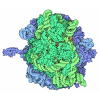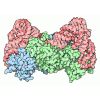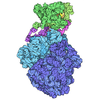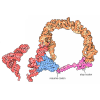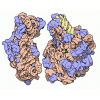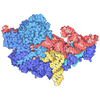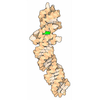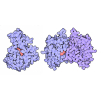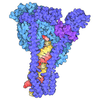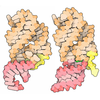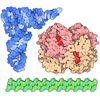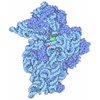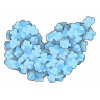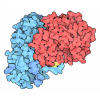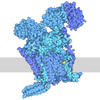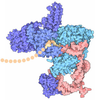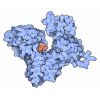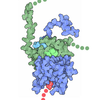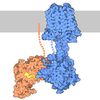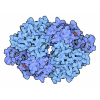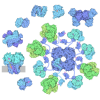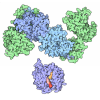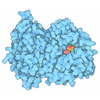[English] 日本語
 Yorodumi
Yorodumi- PDB-6gb2: Unique features of mammalian mitochondrial translation initiation... -
+ Open data
Open data
- Basic information
Basic information
| Entry | Database: PDB / ID: 6gb2 | ||||||||||||
|---|---|---|---|---|---|---|---|---|---|---|---|---|---|
| Title | Unique features of mammalian mitochondrial translation initiation revealed by cryo-EM. This file contains the 39S ribosomal subunit. | ||||||||||||
 Components Components |
| ||||||||||||
 Keywords Keywords | RIBOSOME / translation initiation / initiation factor IF2 / mitochondria / membrane targeting | ||||||||||||
| Function / homology |  Function and homology information Function and homology informationMitochondrial translation elongation / Mitochondrial translation termination / Mitochondrial ribosome-associated quality control / mitochondrial translational initiation / translation factor activity, RNA binding / mitochondrial transcription / ribonuclease III activity / mitochondrial translational termination / mitochondrial translational elongation / translation release factor activity, codon nonspecific ...Mitochondrial translation elongation / Mitochondrial translation termination / Mitochondrial ribosome-associated quality control / mitochondrial translational initiation / translation factor activity, RNA binding / mitochondrial transcription / ribonuclease III activity / mitochondrial translational termination / mitochondrial translational elongation / translation release factor activity, codon nonspecific / Mitochondrial translation initiation / mitochondrial large ribosomal subunit / peptidyl-tRNA hydrolase / mitochondrial ribosome / ribosome disassembly / peptidyl-tRNA hydrolase activity / regulation of translational initiation / mitochondrial translation / organelle membrane / ribosomal small subunit binding / RNA processing / translation initiation factor activity / rescue of stalled cytosolic ribosome / cell junction / double-stranded RNA binding / large ribosomal subunit / mitochondrial inner membrane / rRNA binding / nuclear body / structural constituent of ribosome / ribosome / translation / ribonucleoprotein complex / protein domain specific binding / nucleotide binding / GTPase activity / mRNA binding / positive regulation of DNA-templated transcription / GTP binding / mitochondrion / RNA binding / nucleoplasm / nucleus / plasma membrane / cytoplasm / cytosol Similarity search - Function | ||||||||||||
| Biological species |  Homo sapiens (human) Homo sapiens (human) | ||||||||||||
| Method | ELECTRON MICROSCOPY / single particle reconstruction / cryo EM / Resolution: 3.2 Å | ||||||||||||
 Authors Authors | Kummer, E. / Leibundgut, M. / Boehringer, D. / Ban, N. | ||||||||||||
| Funding support |  Switzerland, 3items Switzerland, 3items
| ||||||||||||
 Citation Citation |  Journal: Nature / Year: 2018 Journal: Nature / Year: 2018Title: Unique features of mammalian mitochondrial translation initiation revealed by cryo-EM. Authors: Eva Kummer / Marc Leibundgut / Oliver Rackham / Richard G Lee / Daniel Boehringer / Aleksandra Filipovska / Nenad Ban /   Abstract: Mitochondria maintain their own specialized protein synthesis machinery, which in mammals is used exclusively for the synthesis of the membrane proteins responsible for oxidative phosphorylation. The ...Mitochondria maintain their own specialized protein synthesis machinery, which in mammals is used exclusively for the synthesis of the membrane proteins responsible for oxidative phosphorylation. The initiation of protein synthesis in mitochondria differs substantially from bacterial or cytosolic translation systems. Mitochondrial translation initiation lacks initiation factor 1, which is essential in all other translation systems from bacteria to mammals. Furthermore, only one type of methionyl transfer RNA (tRNA) is used for both initiation and elongation, necessitating that the initiation factor specifically recognizes the formylated version of tRNA (fMet-tRNA). Lastly, most mitochondrial mRNAs do not possess 5' leader sequences to promote mRNA binding to the ribosome. There is currently little mechanistic insight into mammalian mitochondrial translation initiation, and it is not clear how mRNA engagement, initiator-tRNA recruitment and start-codon selection occur. Here we determine the cryo-EM structure of the complete translation initiation complex from mammalian mitochondria at 3.2 Å. We describe the function of an additional domain insertion that is present in the mammalian mitochondrial initiation factor 2 (mtIF2). By closing the decoding centre, this insertion stabilizes the binding of leaderless mRNAs and induces conformational changes in the rRNA nucleotides involved in decoding. We identify unique features of mtIF2 that are required for specific recognition of fMet-tRNA and regulation of its GTPase activity. Finally, we observe that the ribosomal tunnel in the initiating ribosome is blocked by insertion of the N-terminal portion of mitochondrial protein mL45, which becomes exposed as the ribosome switches to elongation mode and may have an additional role in targeting of mitochondrial ribosomes to the protein-conducting pore in the inner mitochondrial membrane. | ||||||||||||
| History |
|
- Structure visualization
Structure visualization
| Movie |
 Movie viewer Movie viewer |
|---|---|
| Structure viewer | Molecule:  Molmil Molmil Jmol/JSmol Jmol/JSmol |
- Downloads & links
Downloads & links
- Download
Download
| PDBx/mmCIF format |  6gb2.cif.gz 6gb2.cif.gz | 2.8 MB | Display |  PDBx/mmCIF format PDBx/mmCIF format |
|---|---|---|---|---|
| PDB format |  pdb6gb2.ent.gz pdb6gb2.ent.gz | Display |  PDB format PDB format | |
| PDBx/mmJSON format |  6gb2.json.gz 6gb2.json.gz | Tree view |  PDBx/mmJSON format PDBx/mmJSON format | |
| Others |  Other downloads Other downloads |
-Validation report
| Arichive directory |  https://data.pdbj.org/pub/pdb/validation_reports/gb/6gb2 https://data.pdbj.org/pub/pdb/validation_reports/gb/6gb2 ftp://data.pdbj.org/pub/pdb/validation_reports/gb/6gb2 ftp://data.pdbj.org/pub/pdb/validation_reports/gb/6gb2 | HTTPS FTP |
|---|
-Related structure data
| Related structure data |  4370MC  4368C  4369C  6gawC  6gazC C: citing same article ( M: map data used to model this data |
|---|---|
| Similar structure data |
- Links
Links
- Assembly
Assembly
| Deposited unit | 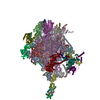
|
|---|---|
| 1 |
|
- Components
Components
+Mitochondrial ribosomal protein ... , 42 types, 48 molecules CLDLELFLGLHLBLB0B1B2B5B6B7B8BDBFBIBJBKBNBOBPBQBRBSBTBUBVBWBX...
-'Mitochondrial ribosomal protein ... , 3 types, 3 molecules B3B4Bv
| #5: Protein | ' Mass: 18585.840 Da / Num. of mol.: 1 / Source method: isolated from a natural source / Source: (natural)  |
|---|---|
| #6: Protein | ' Mass: 15156.537 Da / Num. of mol.: 1 / Source method: isolated from a natural source / Source: (natural)  |
| #52: Protein | ' Mass: 25815.031 Da / Num. of mol.: 1 / Source method: isolated from a natural source / Source: (natural)  |
-Protein , 8 types, 8 molecules B9BCBEBlBpBqBwBz
| #11: Protein | Mass: 10841.016 Da / Num. of mol.: 1 / Source method: isolated from a natural source / Source: (natural)  |
|---|---|
| #14: Protein | Mass: 72811.219 Da / Num. of mol.: 1 Source method: isolated from a genetically manipulated source Details: mitochondrial / Source: (gene. exp.)  Homo sapiens (human) / Gene: MTIF2 / Production host: Homo sapiens (human) / Gene: MTIF2 / Production host:  |
| #16: Protein | Mass: 38427.199 Da / Num. of mol.: 1 / Source method: isolated from a natural source / Source: (natural)  |
| #44: Protein | Mass: 18957.779 Da / Num. of mol.: 1 / Source method: isolated from a natural source / Source: (natural)  |
| #48: Protein | Mass: 12015.747 Da / Num. of mol.: 1 / Source method: isolated from a natural source / Source: (natural)  |
| #49: Protein | Mass: 15957.357 Da / Num. of mol.: 1 / Source method: isolated from a natural source Details: Unassigned residues have been built as poly-alanine. Source: (natural)  |
| #53: Protein | Mass: 49100.504 Da / Num. of mol.: 1 / Source method: isolated from a natural source / Source: (natural)  |
| #55: Protein | Mass: 5846.387 Da / Num. of mol.: 1 / Source method: isolated from a natural source Details: Unassigned secondary structure elements have been built as poly-alanine. Source: (natural)  |
-RNA chain , 3 types, 3 molecules BABBAV
| #12: RNA chain | Mass: 504852.031 Da / Num. of mol.: 1 / Source method: isolated from a natural source / Source: (natural)  |
|---|---|
| #13: RNA chain | Mass: 23402.018 Da / Num. of mol.: 1 / Source method: isolated from a natural source / Source: (natural)  |
| #56: RNA chain | Mass: 22664.498 Da / Num. of mol.: 1 / Source method: obtained synthetically / Source: (synth.)  Homo sapiens (human) / References: GenBank: 1208989970 Homo sapiens (human) / References: GenBank: 1208989970 |
-Non-polymers , 8 types, 228 molecules 

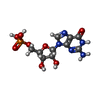
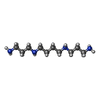
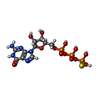

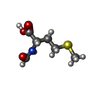








| #57: Chemical | ChemComp-MG / #58: Chemical | #59: Chemical | #60: Chemical | #61: Chemical | ChemComp-GSP / | #62: Chemical | ChemComp-NA / | #63: Chemical | ChemComp-FME / | #64: Water | ChemComp-HOH / | |
|---|
-Experimental details
-Experiment
| Experiment | Method: ELECTRON MICROSCOPY |
|---|---|
| EM experiment | Aggregation state: PARTICLE / 3D reconstruction method: single particle reconstruction |
- Sample preparation
Sample preparation
| Component |
| ||||||||||||||||||||||||||||||
|---|---|---|---|---|---|---|---|---|---|---|---|---|---|---|---|---|---|---|---|---|---|---|---|---|---|---|---|---|---|---|---|
| Molecular weight | Value: 2.85 MDa / Experimental value: NO | ||||||||||||||||||||||||||||||
| Source (natural) |
| ||||||||||||||||||||||||||||||
| Source (recombinant) |
| ||||||||||||||||||||||||||||||
| Buffer solution | pH: 7.6 | ||||||||||||||||||||||||||||||
| Specimen | Conc.: 0.171 mg/ml / Embedding applied: NO / Shadowing applied: NO / Staining applied: NO / Vitrification applied: YES Details: contains 55S mitochondrial ribosome, mitochondrial initiation factor 2, mitochondrial formyl-Met-tRNAMet and MT-CO3 mRNA | ||||||||||||||||||||||||||||||
| Specimen support | Grid material: COPPER / Grid type: Quantifoil R2/2 | ||||||||||||||||||||||||||||||
| Vitrification | Instrument: FEI VITROBOT MARK IV / Cryogen name: ETHANE / Humidity: 100 % / Chamber temperature: 277.15 K |
- Electron microscopy imaging
Electron microscopy imaging
| Experimental equipment |  Model: Titan Krios / Image courtesy: FEI Company |
|---|---|
| Microscopy | Model: FEI TITAN KRIOS |
| Electron gun | Electron source:  FIELD EMISSION GUN / Accelerating voltage: 300 kV / Illumination mode: FLOOD BEAM FIELD EMISSION GUN / Accelerating voltage: 300 kV / Illumination mode: FLOOD BEAM |
| Electron lens | Mode: BRIGHT FIELD |
| Image recording | Average exposure time: 1.4 sec. / Electron dose: 40 e/Å2 / Detector mode: INTEGRATING / Film or detector model: FEI FALCON III (4k x 4k) / Num. of real images: 13936 |
| Image scans | Width: 4096 / Height: 4096 |
- Processing
Processing
| EM software |
| ||||||||||||||||||||||||||||||||||||||||
|---|---|---|---|---|---|---|---|---|---|---|---|---|---|---|---|---|---|---|---|---|---|---|---|---|---|---|---|---|---|---|---|---|---|---|---|---|---|---|---|---|---|
| CTF correction | Type: PHASE FLIPPING AND AMPLITUDE CORRECTION | ||||||||||||||||||||||||||||||||||||||||
| Particle selection | Num. of particles selected: 1366787 | ||||||||||||||||||||||||||||||||||||||||
| 3D reconstruction | Resolution: 3.2 Å / Resolution method: FSC 0.143 CUT-OFF / Num. of particles: 75666 / Algorithm: FOURIER SPACE / Num. of class averages: 1 / Symmetry type: POINT | ||||||||||||||||||||||||||||||||||||||||
| Atomic model building | B value: 56.9 / Protocol: OTHER / Space: RECIPROCAL |
 Movie
Movie Controller
Controller


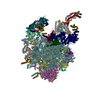



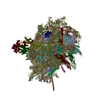

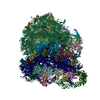
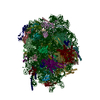
 PDBj
PDBj